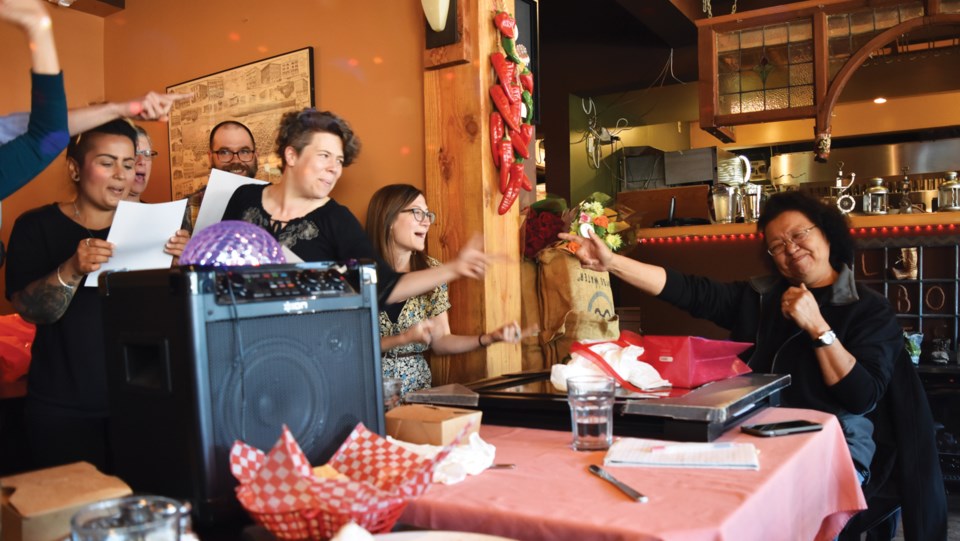Lunch was finished and waiters cleared away dishes of pasta and garlic bread as Sid Quinn, shíshálh Nation’s resource director, stood to speak. Chief Warren Paull, band councillors and Department of Fisheries and Oceans (DFO) staff were among the colleagues, friends and family gathered at The Old Boot Eatery in Sechelt to mark the retirement of their unsung hero, Darlene Bulpit, fisheries technician for the Nation.
Paull, who remembers when Sid Quinn was hired to start the resource department in 1993, described Bulpit’s retirement as “one day nobody wants to really have for someone of her calibre.”
Others said her contributions would be felt for generations to come.
Quinn, standing at the head of the crowded tables, read a note on behalf of Rebecca Reid, a high-ranking DFO official.
“Dear Ms. Bulpit, it gives me great pleasure to thank you for your 27 years of dedication and commitment to protecting and enhancing the fisheries resource.”
Bulpit, a shíshálh Nation member, put her scientific and traditional knowledge to work for the DFO’s salmon enhancement program and improved their understanding of salmon streams in the shíshálh swiya (traditional territory), according to Reid, who was among several people to enumerate Bulpit’s contributions to protecting and enhancing the fish-bearing watersheds over vast stretches of the Sunshine Coast.
Others told personal anecdotes, their stories and praise punctuated by gifts – a custom jacket, a metal bracelet and artwork.
“We were up in Deserted Bay this one day – we had to go about three kilometres past the main waterfall, and I was the leader of our group at that time,” said shíshálh Nation Coun. Keith Julius, remembering a lesson from 30 years ago. “We’re trucking along there and I could hear all the males. All the males were complaining, ‘Keith, how much farther, how much longer do we gotta go?’
“I’m sitting there and I’m thinking to myself, oh, I’ve got to think of something to get all these men on track so we can keep on moving … and as I’m sitting there thinking, this woman stands up and all she said to me was, ‘Come on brother, let’s keep moving.’
“Those are the kinds of things Darlene did. She never let anything stop her.”
Grant McBain, who worked with DFO since the 1980s and now retired himself, described her as “a soldier,” the middleman who kept a cool demeanour while taking orders from Quinn and guiding her crew.
Over the course of her career, “Darlene was instrumental in the release of millions of fish,” said Quinn, at nine sites on the Sunshine Coast, from Chaster Creek to lakes in Pender Harbour.
Her assignments were many and included working at the Chapman Creek hatchery where she educated the public and cared for eggs, collected data and managed the water supply, among other tasks, all the while observing changes. “As years went by, the water was getting less and less,” recalled Bulpit. “Too much sunshine.”
She was later appointed to lead the recovery efforts for the endangered and genetically unique Sakinaw sockeye salmon. Her mandate: rebuild “basically the last sockeye run in the Georgia Strait,” which Grant McBain described as “the J-Pod [of salmon]” – teetering on the brink.
By its nature Bulpit’s work was hopeful, but it was also unforgiving. Over her nearly 30 years on the job, she has watched the decline of the Sunshine Coast’s salmon population first hand. “I think the number one reason for their depletion is the predators. We have a lot more predators out there than there is fish. Everybody loves fish, that’s part of the diet, but they’ve gotta survive, too,” she said. Climate change is another major factor. It’s making water too warm for salmon, and causing drought. “The watersheds, they’ve gone down a lot faster,” Bulpit said. “Look at Chapman Creek. What can we do for Chapman Creek to help them keep a steady flow of water?”
The June 20 lunch kept on for about two hours. Chief Paull was among the last to speak. “On behalf of a grateful nation and out of deep love and respect, thank you.”
Bulpit ribbed her former colleagues and bosses, and through her stories emphasized the job was too important to do without passion. She told the new staff to treat each day as if it was their first, and urged the higher ups to give the resource department’s administrators “a heli-flight” to see the swiya for themselves. “It’s more meaningful for them when they start writing those letters, writing those contracts, to see our territory.”
The party’s grand finale came by way of a simple musical message. A half dozen of her colleagues, mostly young women, plunked a speaker on a table, picked up a microphone and belted out Bulpit’s favourite song, the 1988 classic, The Best.



